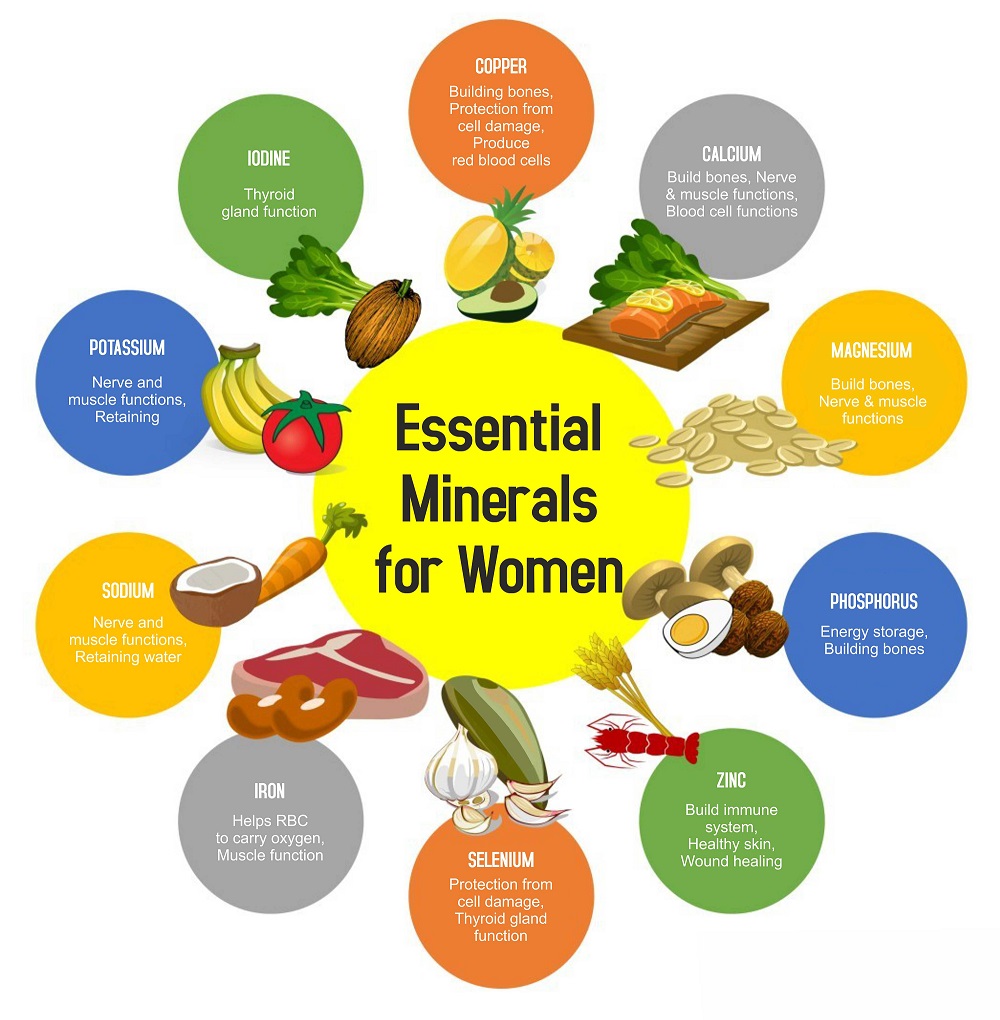Women are prone to neglect their own dietary needs. Sometimes, they are too busy to eat, or they often put the needs of their family first or trying to follow an extreme diet which leaves them short on important minerals thereby feeling hungry and low on energy. All of this can add up to serious shortfalls in their daily nutrition.
It is advisable to avoid junk food and consume fruits and vegetables regularly. However, such a diet also falls short of essential minerals. Let’s look at some of the important factors to understand the role of minerals in women’s life.
Why do women need minerals?
Minerals are necessary nutrients that are needed for the body to function properly. Serious health problems can occur such as hormone imbalances, anemia, etc. because of untreated mineral deficiencies. Different minerals are required at different stages of life.
Function of minerals in our body
The minerals are utilized by the human body for the proper formation of bone and blood. It also helps in maintaining normal cell function. Minerals are composed of 5 percent of the body weight. It functions along with vitamins to preserve the shape and needs of the body. Minerals also act as an important component in many metabolic activities. One of the most important roles of minerals is to maintain the proper balance of water in the body. This factor is controlled by sodium, chloride, and potassium. The other three minerals (calcium, phosphorus, and magnesium) are essential for healthy bones. Major minerals keep traveling through the body and do their respective part in different ways.
Types & Sources of minerals
There are different types of mineral resources. These are mainly divided into three categories – fuel, metallic, and non-metallic. Fuel minerals (such as oil, coal and natural gas) are given more importance since they are accountable for about 86% of mineral production while metallic and non-metallic remain at around 7%.
We are all aware that four elements are crucial and are required for the existence of all living organisms. They are known as oxygen, carbon, hydrogen, and nitrogen. Other than these, there are some chemical elements which are also essential for the sustainability of living organisms and these elements are called dietary minerals. The classification of minerals (dietary minerals) is done in two categories – Macro minerals and Trace minerals. Let’s look at the different types of minerals fall under these two categories. Below table illustrates types of minerals and their uses and foods with minerals.
-
Macro Minerals
The body needs these minerals in large quantities however the deficiency and excess of these minerals can result in various disorders.
| MINERAL | USE | SOURCES |
| Calcium | Build bones, Nerve & muscle functions, Blood cell functions | Green vegetables, Dairy products, Nuts & seeds |
| Sodium | Nerve and muscle functions, Retaining water | Beef, Milk and Cheese, Salt, Beets, Green olives |
| Potassium | Nerve and muscle functions, Retaining | Citrus fruits, Dried fruits, Green vegetables, Banana |
| Magnesium | Build bones, Nerve & muscle functions | Green vegetables, Dairy products, Nuts & Seeds, Seafood, Cereal |
| Chloride | Retain water | Lettuce and Tomato, Cheese, Beef, Salt |
| Phosphorus | Energy storage, Building bones | Fish, Dairy products, Nuts & Peas |
-
Trace Minerals
These minerals are required by the human body in very small quantities however deficiency of minerals can also lead to health problems.
| MINERAL | USE | SOURCES |
| Copper | Building bones, Protection from cell damage, Produce red blood cells | Mushrooms, Shellfish, Chocolate, Nuts & Beans |
| Fluoride | Building bones | Saltwater fish, Tea |
| Iodine | Thyroid gland function | Iodized Salt, Seafood |
| Iron | Helps RBC to carry oxygen, Muscle function | Green vegetables, Beef, Dried fruits, Eggs, Baked potato, Salmon and Tuna |
| Selenium | Protection from cell damage, Thyroid gland function | Chicken and Eggs, Fish and Shellfish, Wheat germ, Red meat |
| Zinc | Build immune system, Healthy skin, Wound healing | Legumes, Red meat |
What minerals should a woman take on a daily basis?
The human body requires a certain amount of minerals each day. The intake of minerals for women is especially required under the following circumstances.
-
- Pregnant women
- Women on low-calorie diets
- Women with problems such as diarrhea, or pancreatitis
- Women with extreme bleeding during menstruation
- Women who breastfeed
- Women with allergies to certain foods
- Women who consume alcohol in an excessive amount
- Cigarette smokers
- Drug addicts
- Women who are disabled or chronically ill
- Vegetarians (to some extent)
Below table is recommended by various health experts and doctors that summarizes on how much quantity is required for a woman’s body for the intake of minerals.
| MINERALS | SUGGESTED DAILY INTAKE | MINERALS | SUGGESTED DAILY INTAKE |
| Zinc | 15 mg | Magnesium | 350 mg |
| Copper | 2 mg | Sodium | 2400 mg |
| Fluorine | 3,5 mg | Selenium | 35 µg* |
| Calcium | 1000 mg | Iron | 15 mg |
| Boron | < 20 mg | Iodine | 150 µg* |
| Chlorine | 3400 mg | Phosphorus | 1000 mg |
| Chromium | 120 µg* | Potassium | 3500 mg |
| Vanadium | < 1,8 mg | Nickel | < 1 mg |
| Manganese | 5 mg | Molybdenum | 75 µg* |
*1000 µg (microgram) = 1mg
Do women need minerals supplements?
Many people follow the food recommendations provided by food guide or dieticians and their body continue meeting with the number of minerals for women that are required on a daily basis. However, certain supplements are recommended to meet nutrient needs for some people.
-
Women of childbearing age
The need for iron increases during pregnancy. All women who could become pregnant should consume about 16 to 20 mg of iron. It not only helps women but also plays an important role in building up the baby’s brain, skull, and spine.
-
Women over the age of 50
Postmenopausal women should select a mineral supplement that should not have much or even no iron (for example a supplement made for seniors). A high iron intake (from iron supplements) may bring adverse effect on the body of such women.
-
Vegetarian women
It is believed that a healthy vegetarian diet meets most nutritional needs however vegetarians mostly rely on the plants because that is the only source of their minerals. Therefore, supplements may be required which can meet their iron needs.
-
Mineral supplements can be required for medical conditions
It is advisable to consume minerals after taking the advice from a physician or a doctor if any woman got operated after a severe infection or is suffering from diseases such as anemia or osteoporosis.
It is recommended to eat various types of nutrient-rich foods which are considered as the best way to get the nutrients that are needed for good health. It is also said that restricted calorie diets leave you short on certain essential nutrients. Here are a few points to consider while considering a supplement.
-
- The food contains certain important nutrients that mineral supplements don’t provide such as fiber, protein, carbohydrate, and essential fats. It is recommended to eat nutrient-rich foods such as green vegetables, milk, cheese, fish, eggs, meat, nuts, legumes, fruits, whole grains, and seeds, even while taking a supplement.
- The human body does not get energy from consuming pills.
- The energy is generated from carbohydrates, fats, and proteins in the food that you eat.
It becomes difficult for a woman to maintain a healthy diet since her priority is to balance the demands of family and work. However, the right food not only supports mood but builds up energy and helps in maintaining a healthy weight. As women age and their bodies go through different physical and hormonal changes, the need for good nutrition continues to evolve. While women tend to need fewer calories than men, the requirements for certain minerals are much higher. Hormonal changes that are associated with childbearing, menstruation, and menopause indicate that women have a higher risk of anemia, osteoporosis, and weakened bones. Therefore, they should take a high amount of minerals such as iron, calcium, and magnesium.














